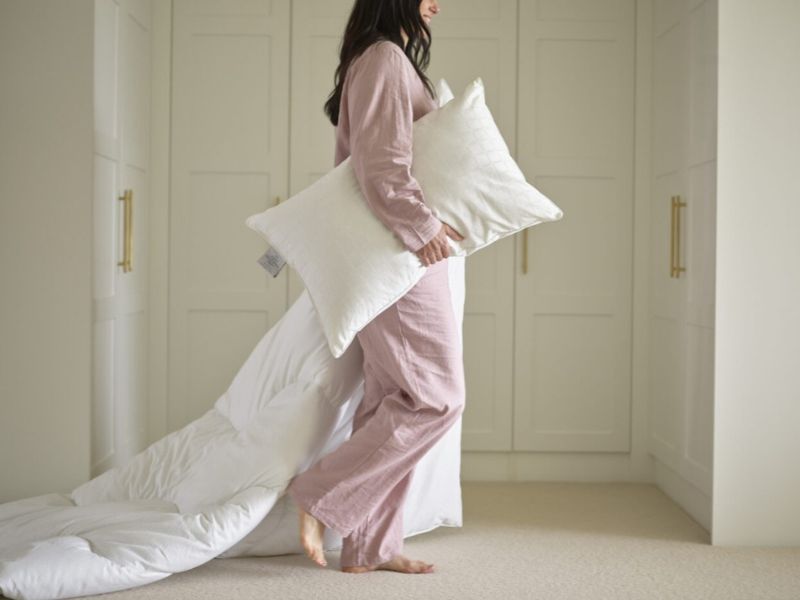How one can Regulate Your Sleep for Shorter Days

On the final Sunday of October annually, the clocks transfer again by an hour to Commonplace Time from 2am to 1am. Come March, daylight saving time “springs ahead” once more. You may not have given a lot thought as to if these transitions have an effect on your well being or how prepared you’re feeling for the day. Moderately than simply following the clock with out considering twice, we predict there’s a better manner: truly planning the way you deal with the clock change so you may really feel and performance your greatest. Under, we’ll share good and sensible methods to handle the October shift relying by yourself sleep profile.
How do clock modifications truly have an effect on your sleep and well being?
Whereas the proof remains to be evolving, right here’s what we all know to date:
The excellent news for October is that folks compensate for just a little sleep after we swap to Commonplace Time. UK information recommend we sometimes acquire 33 minutes the Sunday after the October change (whereas we lose over an hour after the spring change). In pure settings (like tenting), individuals additionally are likely to sleep extra throughout winter’s longer nights, so this shift will help you observe that pure rhythm and go to sleep earlier when you go by the clock.
One factor to be careful for is that extra night darkness can imply extra driving in the dead of night, which can increase crash threat for some. Spring could be a bit trickier, as not like October, spring change is truly linked with a small sleep-loss associated uptick in site visitors accidents and office accidents and their severity. Some research have even recommended modifications in different behaviours as effectively after the spring swap, comparable to grumpiness and irritation.
3 ways you may handle the October clock change
The possibility which fits you greatest relies upon primarily on chronotype (morning lark vs night time owl) and whether or not you normally get sufficient sleep.
-
Comply with the clock change
Shift with society and maintain the identical clock occasions as earlier than. For instance, going to mattress at 11pm and rising at 6am would keep the identical after the change. That is greatest for the early birds or anybody whose social life and schedules align higher with typical night occasions.
-
Ignore the clock change and observe your physique clock
Hold your inside timing the identical, so every part you do occurs one hour earlier by the clock. For instance, going to mattress at 11pm and rising at 6am turns into going to mattress at 10pm and rising at 5am. That is greatest for individuals who already get sufficient sleep and might comfortably run an hour sooner than the social clock.
-
Give your self an additional hour in mattress
Go to mattress one hour earlier however get up concurrently earlier than. For instance, going to mattress at 11pm and rising at 6am turns into going to mattress at 10pm and nonetheless rising at 6am. That is greatest for these with respectable sleep high quality who’re quick on sleep (alarm-wakers, anybody feeling a bit stretched). This manner, you may benefit from the well being perks that come from longer sleep.
Which possibility is best for you?
If you’re an excessive early hen (asleep by 9pm in the summertime): select possibility 1 in any other case you may find yourself drifting into very early winter bedtimes which will be onerous in your social life!
If you’re an evening owl who already will get sufficient sleep (1am-9am within the summer time): possibility 2 can work effectively as you may maintain dwelling by your physique clock and easily run an hour sooner than the wall clock after the change.
If you’re an evening owl who looks like they do not get sufficient sleep: possibility 3 is for you as you may squeeze in some additional relaxation earlier than the alarm goes off.
Suggestions for adjusting to the October clock change
When you select possibility 1 and observe the clock, you’re shifting your physique clock one hour later. This implies adjusting will be tremendous simple when you merely shift your every day routines together with the clock. Within the first week, it is best to maintain morning mild a bit decrease for an additional hour. It is because morning mild tends to shift your physique clock earlier, which you do not need simply but. It’s additionally vital to maintain your night routines regular and goal for constant mattress/wake occasions.
When you select possibility 2 and ignore the clock, there’s no main modifications wanted aside from your alarm. It is best to do every part one hour sooner than what the clock says and stick with the identical sleep sample, mild routine, mealtimes and train habits you have already got.
When you select possibility 3 and add an additional hour in mattress, you’ll be holding your rise time the identical however going to mattress one hour earlier. Since your mornings will begin a bit later to your physique, you may cease your sleep schedule drifting later by:
- Getting vibrant mild instantly after waking up (no less than quarter-hour is sweet however the extra the higher!)
- Occurring a brief stroll when it’s mild, or sitting by a window if the climate is garbage.
- Contemplate investing in a lightweight remedy lamp for round half-hour after waking, aiming for no less than 10,000 lux.
- When you usually have breakfast or get transferring within the morning, maintain doing this quickly after waking as these habits assist regular your physique clock.
- Regulate your caffeine. Stick with your traditional quantity (and even rather less), and attempt to keep away from it after lunchtime so it doesn’t push your physique clock later or make sleep lighter.






